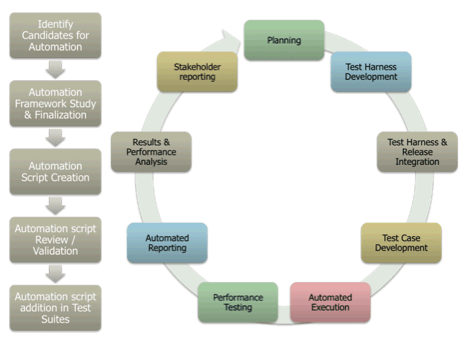Overview
Testing plays a pivotal role in the software development life cycle in delivering a defect-free and reliable product. A fast, repetitive, and reliable test cycle at a low cost is vital to stay competitive in today’s market. Automation testing further enhances the coverage, accuracy, and efficiency of executing tests while providing cost and time reduction benefits, through CI/CD integration and quality metrics.
Test automation involves the creation of repeatable tests, which consist of a set of predefined actions to be executed. Once these tests are created, they can be extended to test different areas of the application. This, combined with the capability of parallel execution on thousands of simulated devices (User Equipment), have reduced the testing time from days to hours.
Hence, Test Automation has become a vital part of successful development projects, with companies aiming to automate most of their manual testing efforts.
At HSC, we understand that the major emphasis that companies put on test automation services is to:
- Reduce the repeated effort (Time and Cost) in testing
- Reduce the defect leakage and increase accuracy
- Increase the depth and scope of tests to help improve software quality
HSC’s Automation Testing Strategy
HSC has a well-defined approach for test automation.
- Our test architects work closely with customers to identify the automation requirements.
- A thorough analysis of all available open-source and commercial automation tools that can serve the requirements.
- Test architects then prepare the automation strategy and present the study to the customer.
- The implementation is started once the customer is satisfied and has approved the chosen test automation strategy.
After the planning phase, we work on developing, integrating, and releasing the Test Harness, a collection of software and test data to support us in the test execution. This is followed by developing test cases and their automated execution and performance testing. Our models generate automated reports, which we then use to analyze the model’s performance and then share these results with the stakeholders.
The implementation approach has been captured in detail in the diagram alongside.
Our Expertise
We have inculcated a deep understanding and expertise in evaluating customer requirements and building tailored test automation frameworks that meet their testing needs. We have rich experience in the latest and in-demand technologies such as Selenium, Appium, Python, and other modern frameworks.
In addition, we can build these automation tools using open-source frameworks and offer them as test automation services, aiding customers in reducing cost and time to market.
We have also built our own tools and frameworks to cover the test automation of mobile applications, web applications, web services, and other use cases. Our Test Management and Execution Framework can be customized easily to match our customer’s specific needs and use cases. These tools can help accelerate your testing processes by quickly creating working prototypes or by accelerating the testing of new product releases.
HSC offers onsite and offsite test automation services across web, mobile, desktop, and API.
Here are some of the many tools in which we have garnered expertise as we have taken on more challenging projects:
Selenium, Appium, Robotium, Grafana, TestRail, OpenCV, BrowserStack, Zephyr, Apache JMeter, Load Runner, Sahi Pro, Cucumber, Jacoco, Watir, Puppeteer, CY, Fiddler, Protractor, TestLink, HP Quality Center, HP UFT, and SauceLabs, among many others.
Our Offerings
Enterprise Applications:
- Test Automation for mobile, web, APIs, and microservice-based applications.
- Functional, non-functional, and compatibility testing
- Cross-browser testing and simulator development
Wireless / Communication:
- Wireless Technologies: WCDMA, LTE, 5G, SatCom testing
- Protocol Testing: RLC / MAC, RRC, NAS, diameter, radius, datacom testing
- Custom simulator development for control and data path testing and automation
Cloud and Devices:
- Performance and scalability testing
- Distributed test framework development
- IoT and Embedded testing
- Android, iOS, and Windows test automation
Managed Testing Services:
- End-to-end testing
- Test consulting and strategy development
- Testing process optimization
- Test execution
DevOps and NetOps:
- Continuous Integration and Continuous Deployment (CI/CD)
- Cloud-based deployments: AWS, Azure, GCP, etc.
- Virtualization and Containerization
- Process automation
- Network automation
Our Accelerators
We use the term “Accelerators” to refer to the tools we have developed in-house. Our tools can integrate seamlessly with your projects and help accelerate the prototyping or the product release roadmap.
Unified Test Automation Framework – UTAF
HSC’s Unified Test Automation Framework (UTAF) is a robust, scriptless framework designed to support seamless Web and Mobile Application Testing and Web Services Testing.
UTAF is a hybrid framework encapsulating keyword-driven and data-driven approaches. UTAF enables end-to-end automation testing of your applications, focusing on quality across the software development life cycle.
Mobile Application Test Automation Framework – MATAF
HSC’s Mobile Application Test Automation Framework (MATAF) is a robust framework to automate mobile deployment and testing completely. MATAF employs a hybrid (keyword and data-driven) approach and supports testing on both Android and iOS platforms.

 Product Engineering Services Customized software development services for diverse domains
Product Engineering Services Customized software development services for diverse domains
 Sustenance Engineering Going beyond maintenance to prolong life of mature products
Sustenance Engineering Going beyond maintenance to prolong life of mature products
 Managed Services Achieve scalability, operational efficiency and business continuity
Managed Services Achieve scalability, operational efficiency and business continuity
 Technology Consulting & Architecture Leverage the extensive knowledge of our Domain Experts
Technology Consulting & Architecture Leverage the extensive knowledge of our Domain Experts
































